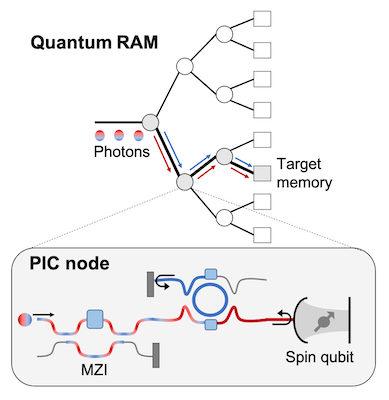
Scalable and High-Fidelity Quantum Random Access Memory in Spin-Photon Networks
Kevin C. Chen | Wenhan Dai | Carlos Errando-Herranz | Seth Lloyd | Dirk Englund
A quantum random access memory (qRAM) is considered an essential computing unit to enable polynomial speedups in quantum information processing. Proposed implementations include the use of neutral atoms and superconducting circuits to construct a binary tree but these systems still require demonstrations of the elementary components. Here, we propose a photonic-integrated-circuit (PIC) architecture integrated with solid-state memories as a viable platform for constructing a qRAM. We also present an alternative scheme based on quantum teleportation and extend it to the context of quantum networks. Both implementations realize the two key qRAM operations, (1) quantum state transfer and (2) quantum routing, with already demonstrated components: electro-optic modulators, aMach-Zehnder interferometer (MZI) network, and nanocavities coupled to artificial atoms for spin-based memory writing and retrieval.
Our approaches furthermore benefit from built-in error detection based on photon heralding. Detailed theoretical analysis of the qRAM efficiency and query fidelity shows that our proposal presents viable near-term designs for a general qRAM.
Funding Sources: National Science Foundation Graduate Research Fellowships Program (GRFP) | Army Research Laboratory Center for Distributed Quantum Information (CDQI) | MITRE Corporation Moonshot program.

Kevin Chen
Affiliation: MIT, Graduate Student
Areas of Research
-
- Sold-State Defect Engineering
- Atomic, Molecular, & Optical Physics
Open to
-
- Internships
- Full-time positions
